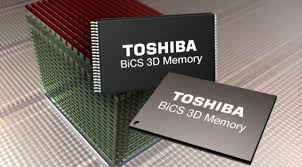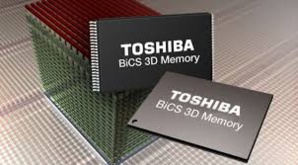Doubts about whether it Toshiba can plug a balance sheet hole in time to avoid a delisting and keep the unit competitive were raised after the Japanese conglomerate failed to seal a deal to sell its prized chip business by an internal deadline of Thursday.
It was continuing to talk with three suitors - a consortium led by Western Digital as well as groups led by Bain Capital and by Taiwan’s Foxconn and it has tried but so far not come to an agreement, the embattled Japanese conglomerate said in a statement.
Marked by a slew of revised bids, changing alliances among bidding groups and the threat of legal action from joint venture partner Western Digital, the sale of the world’s No. 2 maker of NAND chips - worth $17 billion to $18 billion - has become a contentious battle.
Discussions between Western Digital and Toshiba were in final stages, with Steve Milligan, the chief executive of the U.S. firm, in town to hammer out details, sources said early this week despite frayed relations between the two.
However, sources have also said that the two sides are struggling to come to an agreement over the U.S. company’s future stake in the business.
Any time later than the end of the month would make it difficult to gain regulatory approvals before its books closed in March and therefore Toshiba was working under creditor pressure to strike a deal by the end of the month.
However, Toshiba Chief Executive Satoshi Tsunakawa told the firm’s creditor banks on Wednesday: “Please give me an extra week or so,” in a sign that an agreement might not be too far off.
While Tsunakawa repeated his determination to get a deal done and dusted by March, he did not say which bidding group was favoured.
Toshiba would likely have to book negative net worth for a second year running, which could result in it being delisted without the money to cover billions in liabilities at it bankrupt nuclear unit Westinghouse.
Allowing it to capitalise on a boom in demand for semiconductors and extend its lead in advanced 3D chips. delays are set to only make rival Samsung Electronics’ upper hand in NAND chips stronger.
“Toshiba must build a factory in order to satisfy demand for 3D NAND, but right now Toshiba doesn’t have the money,” said Lee Kyu-jin, senior analyst at Ebest Investment & Securities.
“Meanwhile, Samsung is showing drive in the 3D NAND market, including building a factory dedicated to 3D NAND in order to dominate demand.”
By bringing in Apple Inc to help bolster its bid, efforts to strike a deal have been complicated by Bain’s last minute resubmission of a 2 trillion yen ($18.1 billion) offer.
Due to its deep ties with China and the Japanese government’s desire to keep key semiconductor technology owned by Japanese-U.S. capital, Foxconn, the world’s largest contract electronics maker formally known as Hon Hai Precision Industry, is seen as an unlikely winner.
(Source:www.reuters.com)
It was continuing to talk with three suitors - a consortium led by Western Digital as well as groups led by Bain Capital and by Taiwan’s Foxconn and it has tried but so far not come to an agreement, the embattled Japanese conglomerate said in a statement.
Marked by a slew of revised bids, changing alliances among bidding groups and the threat of legal action from joint venture partner Western Digital, the sale of the world’s No. 2 maker of NAND chips - worth $17 billion to $18 billion - has become a contentious battle.
Discussions between Western Digital and Toshiba were in final stages, with Steve Milligan, the chief executive of the U.S. firm, in town to hammer out details, sources said early this week despite frayed relations between the two.
However, sources have also said that the two sides are struggling to come to an agreement over the U.S. company’s future stake in the business.
Any time later than the end of the month would make it difficult to gain regulatory approvals before its books closed in March and therefore Toshiba was working under creditor pressure to strike a deal by the end of the month.
However, Toshiba Chief Executive Satoshi Tsunakawa told the firm’s creditor banks on Wednesday: “Please give me an extra week or so,” in a sign that an agreement might not be too far off.
While Tsunakawa repeated his determination to get a deal done and dusted by March, he did not say which bidding group was favoured.
Toshiba would likely have to book negative net worth for a second year running, which could result in it being delisted without the money to cover billions in liabilities at it bankrupt nuclear unit Westinghouse.
Allowing it to capitalise on a boom in demand for semiconductors and extend its lead in advanced 3D chips. delays are set to only make rival Samsung Electronics’ upper hand in NAND chips stronger.
“Toshiba must build a factory in order to satisfy demand for 3D NAND, but right now Toshiba doesn’t have the money,” said Lee Kyu-jin, senior analyst at Ebest Investment & Securities.
“Meanwhile, Samsung is showing drive in the 3D NAND market, including building a factory dedicated to 3D NAND in order to dominate demand.”
By bringing in Apple Inc to help bolster its bid, efforts to strike a deal have been complicated by Bain’s last minute resubmission of a 2 trillion yen ($18.1 billion) offer.
Due to its deep ties with China and the Japanese government’s desire to keep key semiconductor technology owned by Japanese-U.S. capital, Foxconn, the world’s largest contract electronics maker formally known as Hon Hai Precision Industry, is seen as an unlikely winner.
(Source:www.reuters.com)






